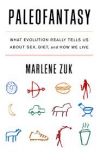
25 Apr 2013 03:57:07
"If there has been no spiritual change of kind / Within our species since Cro‑Magnon Man …" Louis MacNeice, who wrote this nearly 80 years ago, could be excused a little poetic licence, but it is only 12 years since the distinguished evolutionary biologist Stephen Jay Gould expressed more or less the same idea: "There's been no biological change in humans in 40,000 or 50,000 years. Everything we call culture and civilisation we've built with the same body and brain." Not only has this become received scientific wisdom but it has passed into popular consciousness and spawned fad diets. Marlene Zuk is an evolutionary biologist at the University of Minnesota and Paleofantasy targets the movement that insists we are biologically adapted to a Palaeolithic diet and lifestyle. On the face of it, the idea seems plausible: in the standard model of human evolution, anatomically modern Homo sapiens have been around for around 200,000 years, only 10,000 of them as farmers, let alone modern industrial people. Evolution is slow, so it stands to reason that we haven't had time to adapt to the huge changes in our lifestyle.
Many evolutionary biologists, however, including the author of this book, believe that this is wrong. The changes wrought in the human genome by settled farming and the consequent enormous growth in population can indeed be seen: they are profound and have been rapid.
"Drinka Pinta Milka Day" could be the slogan for the new thinking. It would have made no sense to the Cro‑Magnons (from around 43,000 BP) because, even if they could have collected milk from the wild animals they slaughtered for meat they would not have been able to digest it. All mammalian babies can digest milk, but the gene that allows this switches off at the age of weaning. Except in many modern humans. In the most northern human populations, ie Scandinavian, almost 100% can digest milk. The percentage declines as you track south‑east. A single base pair mutation allows adults to drink milk. It emerged around 7,500 years ago with the first dairying in southern Turkey, and as these herders moved north and west the milk drinkers out-bred the rest. This is rapid evolution and it's not the only case.
Zuk discusses the evidence that human beings are still evolving. On one level, trying to eat like a caveman is simply the latest version of Rousseau's noble savage. On another, it's just one more crazy consumer society cult, with its faux-sophisticated peddling of pseudo-knowledge. Zuk quotes a typical example: "there's three problems with tubers: a) Poisonous substances; b) Carb load; c) Problems we are yet to discover." This is about the potato: a significant world problem of our time, no doubt.
She spends too much time swatting these know-nothings, but her take on the many controversies and uncertainties surrounding evolution is both wise and measured. Zuk is especially good at explaining how evolution is a tinkerer, an opportunist; it isn't going anywhere and it never gets there. The idea, so often quoted, that some species are "perfectly adapted to their environment" is wrong. Both the environment and the genes are always drifting to some place else and there is no diet that would be "evolutionarily correct".
Zuk is strong, too, when it comes to combating some familiar misconceptions, especially those misleading statistics about sharing 99% or 98.4% or 95% (take your pick) of our DNA with chimps. There are 3bn base pairs in the genome, and the milk tolerance gene required just a single base change to reactivate it, as do many major shifts in function. She points out the fallacy of simply counting how many base sequences creatures have in common: "if all you had was an alphabet, you could easily end up concluding that Hamlet and the script for an episode of the Sopranos were the same thing since they use exactly the same letters". The raw human genome, as sequenced around 10 years ago, was just a heap of letters in which noone could tell a hawk from a handsaw. Some of us, paleofantasists aside, are starting to make better sense of it now.
The most fruitful chapter is that on medicine. Genomics is now revealing our tangled interactions with infectious agents, one of the main consequences of our domestication of animals over the last 10,000 years. A gene known as CCR5-delta confers resistance to Aids if there are two copies (one from each parent). Tracing the emergence of this gene variant has involved tracking the course of the Black Death and smallpox. Plague has now been eliminated as the source of this gene, but smallpox is more likely.
The complexity of these questions is highlighted by the discovery that CCR5-delta increases susceptibility to the recently evolved West Nile disease. There are no perfect fits or fixes, but it is painstaking work like this that will help us cope with whatever comes next, not a prescription for a stone age diet.

